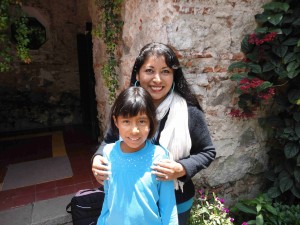 This summer at Latin American Heritage Camp, a panel of teen and adult adoptees dedicated a large percentage of their discussion to the importance of learning, speaking, and/or retaining the language of one’s birth country. The consensus was that language is critical if one wishes to interface with birth family, foster family, orphanage family, or, indeed, the culture at large, in a meaningful way. That’s true in my own life, as well: Speaking even elementary Spanish has allowed me to communicate with many more people in Guatemala than I would be able to otherwise.
This summer at Latin American Heritage Camp, a panel of teen and adult adoptees dedicated a large percentage of their discussion to the importance of learning, speaking, and/or retaining the language of one’s birth country. The consensus was that language is critical if one wishes to interface with birth family, foster family, orphanage family, or, indeed, the culture at large, in a meaningful way. That’s true in my own life, as well: Speaking even elementary Spanish has allowed me to communicate with many more people in Guatemala than I would be able to otherwise.
Not that teaching a child a second language is easy. For my husband and me, it has been anything but that. Neither of us is fluent in Spanish, which is our biggest obstacle. And not only do we not employ a nanny who speaks Spanish, we rarely, if ever, hire a babysitter. Our local public school is not bilingual, and though we have a few Spanish-speaking friends, their children prefer to speak English while playing with our kids. This year, in third grade, Olivia will study Spanish. We’re lucky that it’s the second language taught in California schools. What about the kids adopted from Nepal or Russia or Ethiopia? How do they learn to communicate with others from their homeland?
The good news is that during this past trip to Guatemala, Olivia saw and understood the benefits of speaking Spanish. While listening to one conversation I carried on with someone, she said with admiration, “Mom, you speak a lot of Spanish!” Reader, believe me, I don’t. But you get the idea: In a real-life example, my daughter realized the efficacy of learning a second language. You can talk to people who don’t speak English!
Guatemala is renowned for its language schools. Here is link to a list of some of them. For the last weeks we were there, I managed to convince Olivia to attend morning classes while I posted my blog. She agreed that learning new vocabulary while drawing pictures and making figures with clay was a lot more fun than watching me wrestle with my USB flash drive at Conexion. The photo above is of her with her maestra.
For anyone who is considering Spanish school, I say “go.” Olivia attended San Jose El Viejo–because it was closest to our apartment and because the children of a woman I met through an adoption listserve were attending—and loved it. But I don’t think you can go wrong with any of them.
I’m not deluding myself into believing that Olivia speaks Spanish, or will retain any of the information that she learned. Now that she’s visited Guatemala, though, and attended school, she sees that speaking Spanish is an attainable goal, and one that multiplies her opportunities to communicate. That one outcome, to me, makes the entire trip worthwhile.
Tags: adoptees and language, Colorado Heritage Camp, Conexion Antigua Guatemala, language schools Antigua Guatemala, Latin American Heritage Camp, San Jose El Viejo Antigua Guatemala



 ShareThis
ShareThis

being bi-lingual is definetly a plus and being able to use the language learned with shared heritage is another plus for sure. your choice to enrich olivias life with this gift is miraculous 🙂
cynthia: you are such a positive person, always. thanks for the vote of confidence.
I just wanted to say that I found your site via Yahoo and I am glad I did. Keep up the good work and I will make sure to bookmark you for when I have more free time away from the books. Thanks again!